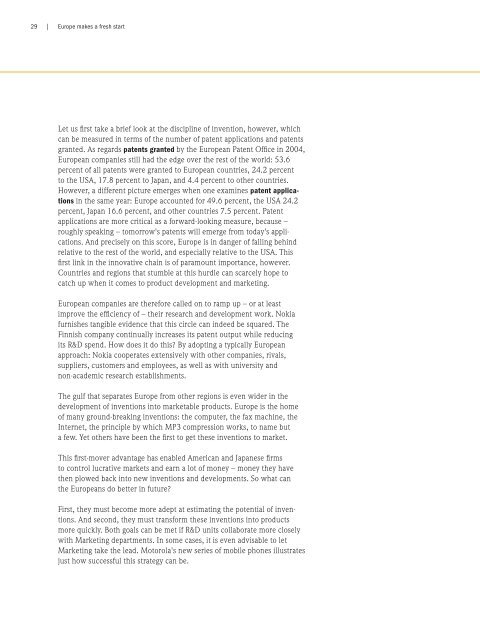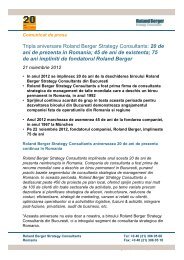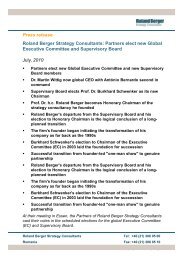Europe makes a fresh start - Roland Berger Strategy Consultants
Europe makes a fresh start - Roland Berger Strategy Consultants
Europe makes a fresh start - Roland Berger Strategy Consultants
You also want an ePaper? Increase the reach of your titles
YUMPU automatically turns print PDFs into web optimized ePapers that Google loves.
29 |<br />
<strong>Europe</strong> <strong>makes</strong> a <strong>fresh</strong> <strong>start</strong><br />
Let us first take a brief look at the discipline of invention, however, which<br />
can be measured in terms of the number of patent applications and patents<br />
granted. As regards patents granted by the <strong>Europe</strong>an Patent Office in 2004,<br />
<strong>Europe</strong>an companies still had the edge over the rest of the world: 53.6<br />
percent of all patents were granted to <strong>Europe</strong>an countries, 24.2 percent<br />
to the USA, 17.8 percent to Japan, and 4.4 percent to other countries.<br />
However, a different picture emerges when one examines patent applications<br />
in the same year: <strong>Europe</strong> accounted for 49.6 percent, the USA 24.2<br />
percent, Japan 16.6 percent, and other countries 7.5 percent. Patent<br />
applications are more critical as a forward-looking measure, because –<br />
roughly speaking – tomorrow's patents will emerge from today's applications.<br />
And precisely on this score, <strong>Europe</strong> is in danger of falling behind<br />
relative to the rest of the world, and especially relative to the USA. This<br />
first link in the innovative chain is of paramount importance, however.<br />
Countries and regions that stumble at this hurdle can scarcely hope to<br />
catch up when it comes to product development and marketing.<br />
<strong>Europe</strong>an companies are therefore called on to ramp up – or at least<br />
improve the efficiency of – their research and development work. Nokia<br />
furnishes tangible evidence that this circle can indeed be squared. The<br />
Finnish company continually increases its patent output while reducing<br />
its R&D spend. How does it do this? By adopting a typically <strong>Europe</strong>an<br />
approach: Nokia cooperates extensively with other companies, rivals,<br />
suppliers, customers and employees, as well as with university and<br />
non-academic research establishments.<br />
The gulf that separates <strong>Europe</strong> from other regions is even wider in the<br />
development of inventions into marketable products. <strong>Europe</strong> is the home<br />
of many ground-breaking inventions: the computer, the fax machine, the<br />
Internet, the principle by which MP3 compression works, to name but<br />
a few. Yet others have been the first to get these inventions to market.<br />
This first-mover advantage has enabled American and Japanese firms<br />
to control lucrative markets and earn a lot of money – money they have<br />
then plowed back into new inventions and developments. So what can<br />
the <strong>Europe</strong>ans do better in future?<br />
First, they must become more adept at estimating the potential of inventions.<br />
And second, they must transform these inventions into products<br />
more quickly. Both goals can be met if R&D units collaborate more closely<br />
with Marketing departments. In some cases, it is even advisable to let<br />
Marketing take the lead. Motorola's new series of mobile phones illustrates<br />
just how successful this strategy can be.






